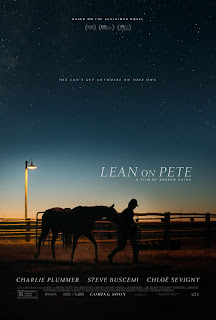Lean on Pete (2018)
Lean on Pete is somehow bleak yet beautiful.
I was taken aback by how brutal this film is to its
protagonist. Charley’s life as shown in the film does not start too great, and
when life begins to hit him with blow after blow, taking one thing he loves
after another away from him, it begins to become almost depressing. By the end
of the film, Charley has almost nothing to continue living for – and the fact
that he is just fifteen years old and has seen more life than most middle-aged
adults I know makes that all the more heartbreaking. He finds a companion in
the titular Pete for a while, becoming attached to this aging racehorse; and
when he takes Pete’s future into his own hands and runs away with him, it is done
with such poeticism and such little dialogue that makes it resonate incredibly
well.
As good as the film continues to be after that moment, Lean
on Pete begins to show its flaws not long after. As events transpire on
Charley and Pete’s journey, everything starts to feel incredibly drawn-out. Part
of this stems from how much Charley is beaten down on this odyssey of sorts,
but there is a natural endpoint for the film that it just breezes past and
continues for almost another half hour, showing us a portrait of Charley that
is even more bleak than one could possibly imagine. I understand why this last
portion is part of the film, as it does show how he deals with some varying
circumstances, but I wanted to stop watching it because I felt so much for
Charley and became uncomfortable with how many times life hit him with a
baseball bat in the gut. Lean on Pete shows very little empathy for him
and does not attempt to make melodrama out of his circumstances, electing for
the ethereal route instead. The cinematography is gorgeous, highlighting the
bleakness of the American northwest through which Charley and Pete must
traverse while also reflecting the reality of Charley’s life. The film’s
structure also does its story justice, feeling more episodic in nature because
of how it does not revisit characters after Charley moves on in his journey. There
is just so little hope in this film, and that makes it very hard to watch.
Charlie Plummer, though, gives the performance of his life
as Charley, showing so much depth that you can practically see the many layers
of emotion on his worn, dirt-ridden face. I enjoyed him a lot in Ridley Scott’s
latest film All the Money in the World, and seeing him get such a rich,
emotional role like this one and doing so well with it makes me excited for how
his career will pan out. Steve Buscemi delivers a surprisingly nuanced
performance as Dell, Pete’s owner and Charley’s boss for most of the film; he paints
a cynical yet sympathetic picture of his character. The rest of the
performances augment Plummer quite well, all contributing different things to
his character’s journey for purpose and identity in a harsh reality.
I wish I could universally recommend Lean on Pete, as
it does tell a compelling and heart-ripping story and shows the true talent of
Charlie Plummer. Despite all that, it does move slowly at times, and when
combined with its bleak aesthetic and story that pacing can become draining,
albeit for the right reasons. This is an incredibly depressing film, ethereal
in how it tells its story and skillfully avoiding melodrama when other films
might lean into causing empathy for the protagonist. For that reason, it might
not be for everyone; but if you find yourself interested, you might be in for
one rich journey.
My recommendation: If you can handle bleak, depressing
films, then watch it.
My rating: 81/100




Comments
Post a Comment